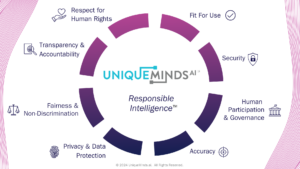In healthcare, the stakes are high. Decisions about diagnosis, treatment, and care delivery directly impact patient outcomes. But despite our best intentions, bias has historically been a significant issue in medical practice—often leading to unequal treatment for individuals based on race, gender, socioeconomic status, or other factors. Whether implicit or explicit, this bias can have far-reaching consequences for patient health and well-being.
Fortunately, advancements in artificial intelligence (AI) offer a promising pathway to identify, reduce, and even eliminate bias in healthcare decision-making. In this blog, we’ll explore how AI can help create more equitable and non-discriminatory healthcare systems for all patients.
AI has the power to revolutionize healthcare, not only by improving efficiency and accuracy but also by making healthcare more equitable. By leveraging AI’s ability to identify and address biases, healthcare systems can provide fairer, more personalized care to all patients. However, achieving these goals requires frameworks that prioritize transparency, inclusivity, and ethical oversight.
Through UniqueMinds.AI’s Responsible AI Framework for Healthcare (RAIFH), we are working to ensure that AI systems are designed and deployed in ways that prioritize human rights, equity, and non-discrimination. With RAIFH, healthcare organizations can deploy AI-driven solutions that are not only innovative and efficient but also ethical, inclusive, and respectful of every patient.
The Problem of Bias in Healthcare
Bias in healthcare is not a new issue, but it has garnered more attention in recent years as studies continue to reveal disparities in treatment. Research has shown that marginalized groups—particularly racial and ethnic minorities and women—often receive lower-quality care, experience longer wait times, and face misdiagnosis or delayed diagnoses. Even subtle biases, whether conscious or unconscious, can affect how healthcare professionals assess and treat patients.
For instance, Black patients may be less likely to receive pain management medications compared to their white counterparts, or women may face delays in being diagnosed with certain conditions, such as heart disease, which are often perceived as more common in men. These biases can stem from a variety of sources, including historical inequalities, structural issues within healthcare systems, and even the data used to train medical models.
The Promise of AI in Tackling Bias
Artificial intelligence, when used responsibly, can be a game-changer in mitigating healthcare biases. AI systems can be trained to detect patterns of bias in healthcare data, helping providers recognize and address these disparities. Here’s how AI can support more equitable healthcare practices:
- Objective Decision-Making
AI systems can assist healthcare professionals by offering data-driven recommendations that are based on objective criteria rather than personal judgment or stereotypes. By analyzing vast amounts of data from medical records, diagnostic tools, and clinical guidelines, AI can help ensure that decisions are based on the best available evidence, reducing the potential for bias.
- Data-Driven Insights to Identify Disparities
One of the most significant ways AI can help is by identifying disparities in care delivery. AI can analyze large datasets to uncover patterns of discrimination that might go unnoticed by human clinicians. For example, algorithms can flag when certain groups receive fewer treatments or experience delays in care, allowing healthcare organizations to take corrective action and ensure equitable access to medical services.
- Personalized Care
AI has the potential to deliver more personalized care by considering individual patient characteristics, rather than relying on generalized assumptions. Advanced machine learning models can be trained to account for a wide range of variables—such as age, medical history, and socioeconomic background—to provide tailored treatment recommendations. This ensures that each patient’s unique needs are met, regardless of their demographic background.
- Bias Auditing of AI Models
AI models themselves are not immune to bias. If the data used to train an AI system reflects historical inequalities, the AI will learn those biases and perpetuate them. However, AI also provides the tools for self-correction. Regular audits of AI models can help identify and address potential biases in algorithms, ensuring they are trained on diverse and representative datasets. Additionally, new techniques such as “fairness-aware” algorithms can be employed to reduce the risk of discriminatory outcomes.
- Bias Detection in Medical Data
Data is the backbone of AI, but not all medical data is created equal. In many instances, datasets used to train AI models may be incomplete, unbalanced, or reflect systemic biases. For example, if a dataset over-represents one demographic group while under-representing others, AI algorithms may become skewed toward the characteristics of the majority group. AI systems can be designed to assess the quality of data and ensure it accurately reflects diverse patient populations, ultimately leading to more inclusive healthcare solutions.

Real-World Examples of AI Reducing Bias in Healthcare
Several healthcare organizations and technology companies are already taking steps to apply AI in ways that reduce bias. For instance:
- IBM Watson Health has developed AI tools to help clinicians make more accurate decisions in cancer diagnosis and treatment, with an emphasis on ensuring that treatment options are equitable for all patients, regardless of their background.
- Google Health has worked on AI models to predict patient outcomes and recommend interventions that are personalized to each individual. They are focused on training their models on diverse datasets to ensure fair representation of all demographic groups.
- Health systems like Kaiser Permanente have begun using AI-driven predictive tools to identify patients who may be at higher risk for conditions like diabetes or heart disease, ensuring that care is provided proactively and equitably across different patient populations.
Ensuring Ethical AI in Healthcare
While AI holds significant potential to reduce bias, there are important ethical considerations to keep in mind. Ensuring that AI-driven systems are transparent, accountable, and free from discrimination requires continuous oversight. Healthcare providers must commit to:
- Bias mitigation: Training AI models on diverse, representative datasets and regularly testing them for biases.
- Ethical guidelines: Establishing clear ethical guidelines for AI development and usage, ensuring that these technologies are aligned with the principles of fairness and equity.
- Collaboration with experts: Engaging ethicists, healthcare professionals, and patient advocacy groups in the development and deployment of AI systems to ensure that diverse perspectives are considered.
How UniqueMinds’ Responsible AI Framework (RAIFH) Can Help Mitigate Bias
At UniqueMinds.AI, we believe that ensuring human rights are at the heart of AI systems isn’t just about addressing ethical concerns—it’s about creating AI solutions that are secure, unbiased, and preserve data privacy. This philosophy is particularly important in healthcare, where biases can lead to negative outcomes for marginalized communities.
To address these challenges, we developed the Responsible AI Framework for Healthcare (RAIFH), a framework specifically designed to ensure that human rights principles are integrated throughout the AI lifecycle. The RAIFH helps mitigate bias in healthcare AI by focusing on several core pillars:

- Equity and Inclusion
The RAIFH emphasizes the importance of diverse datasets and equitable treatment algorithms. By ensuring that AI systems are designed to serve all populations fairly—including underserved and historically marginalized communities—RAIFH helps ensure that biases related to race, gender, socioeconomic status, and other factors are minimized. The framework focuses on creating AI solutions that are inclusive and can address the unique needs of diverse patient populations.
- Transparency and Accountability
To foster trust in AI, the RAIFH requires AI decisions to be traceable and explainable. This means that healthcare organizations can track how decisions are made, why specific actions are recommended, and which data influenced those decisions. With clear documentation and audit trails, RAIFH helps ensure that AI systems are transparent in their decision-making process, which is crucial for accountability and bias mitigation.
- Patient Autonomy and Consent
The RAIFH places a strong emphasis on patient autonomy by ensuring that AI technologies augment, not replace, human judgment. It empowers patients by ensuring they are fully informed and that their privacy is respected. The framework also prioritizes patient consent, ensuring that AI systems respect the individual’s right to control their personal data and participate actively in decisions regarding their healthcare.
- Continuous Monitoring for Bias
Bias in AI systems is not static, and it can creep into models over time. The RAIFH incorporates continuous monitoring and model auditing to ensure AI systems remain fair and unbiased. Through ongoing evaluations, the framework helps prevent discriminatory practices from emerging, maintaining fairness across all patient populations.
- Governance and Ethical Oversight
The RAIFH also provides a comprehensive governance structure that helps healthcare organizations navigate the ethical implications of AI. This includes ensuring compliance with global data protection standards, ethical guidelines, and regulatory requirements, making sure that AI in healthcare is not only effective but also ethical and respectful of human rights.
Let’s work together to create a healthcare system where every patient, regardless of background, receives the care they deserve.
Andrea Gaddie Bartlett is a visionary leader with more than 20 years experience driving digital transformation in the healthcare, life sciences and technology industries. She is the CEO and founder of UniqueMindsAI.







